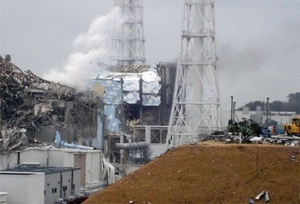
From Ukraine peace plans to Kazakh uranium—all that and more in our new nuclear digest
Our November Nuclear Digest by Bellona’s Environmental Transparency Center is out now. Here’s a quick taste of just three nuclear issues arising in U...
News

Publish date: June 22, 2011
Written by: Andreas Kokkvoll Tveit
Translated by: Charles Digges
News
“Too many have too much to lose by not strenghting the Agency,”he added.
More than 1000 delegates have gathered in Vienna for the IAEA’s ministerial meetings that kicked off Monday and will continue until Friday.
Bellona’s Bøhmer – who has been Norway’s resident go-to guru on Fukushima for the media – is among those in attendence.
After the conference’s the first day, Bøhmer reported that the dominant theme is the future of the IAEA in the post Fukushima era. A number of national energy ministers are in attendence.
“It is being stressed again and again from the dais that the agency must be strenghtened as an independent body, and that the international nuclear safety regime must be upgraded,” said Bøhmer from Vienna.
This is a cause that Bøhmer and Bellona support, but he is concerned that this notion may devovle into idle chat at the conference.
“Nuclear power is not safe, but a stronger IAEA with an eye to more internationally binding international safety requirments, several independent risk assessments, an enhanced presence at accidents and thorough stress tests would improve the situation,” said Bøhmer. “But unfortunatly, I think there are too many powerful contries whose interests run contrary to this.”
Bøhmer pointed out Russia and Great Britain as countries that illustrate his point , and which have many aged reactors in operation.
“Both the oldest Russian reactors and the British Magnox reactors would be difficult to keep in operation if there were new and stricter safety requirements,” he said.
According to documents recently obtained by Bellona Web, Russia’s state nuclear corporation admitted in a stunningly candid report to President Dmitry Medvedev that the first round of stress tests on Russian reactors following Fukushima that the vast majority of Russia’s reactors are seriously underprepared for all manner of mishaps, including natural disasters.
The backdrop for the discussion of the IAEA’s roll is that many feel that it betrayed its duties at the ongoing Fukushima Daiichi disaster, which has been ongoing since a March 11 tsunami and earthquake stuck the plant, rendering it helpless without primary or back up power and coolant and spewing radioactivity into the air.
The IAEA was heavily dependent on information from the Japanese government, which, time has shown was extremely unreliable, delayed and often simply surpressed.
“Throughout the Fukushima crisis, the IAEA supported Japan’s scientific research and assessments of the severity of the situation,” said Bøhmer. “This is unacceptable if the IAEA is to be an independent watchdog that people trust.”
Bøhmer continued to say that “The agency was late to arrive on the scene, and was largely an appendage of the Japanese government,” adding that nuclear authorities in both France and the United States recommended a far wider evacuation zone than the 20 kilometer radius around the plant that was imposed by Japan. The US told its citizens to evacuate the 80 kilometer surrounding Fukushma Daiichi, and Norway relocated its own embassy.
“The mood at the ministerial meeting is set by the fact that people understand this is actually a gathering about the future of nuclear power,” said Bøhmer. “If they cannot raise the confidence level among the people, it will sink even lower than it already is.”
Bøhmer noted that Yukiya Amano, the IAEA’s secretary general, noted in the preliminary meetings on Tuesday that the current meeting is an important one concerning the future of this energy source.
Amano had long sought to distance the IAEA from individual nations’ safety policy’s and during the Fukushima crisis told the IAEA’s board of governors that the agency needed to distance itself from being an international arbiter of nuclear safety.
Even earlier, last summer, in an interview with Bellona Web in Lithuania, Amano said, “We guarantee only assurances in non-proliferation [of nuclear weapons]. Safety is the responsibility of the nation members.”
One of the major difficulties for supporters of nuclear power is that additional safety requirements will also be an obstacle to what has been termed the “nuclear renaissance.” The more stringent are the national and international regulations, the higher is the cost of new reactors.
“When many nuclear power plants are ripe for replacement due to age, and the price level for new reactors is already sky high and does not leave nuclear enthusiats much to cheer for,” said Bøhmer, who would like to see a phasing out of nuclear energy over the coming years. So far, Europe is off to a good start in this endeavor: Germany has voted to close its last plant by 2022, Switerland will phase out by 2035, and Italy turned in a landslide referendum two weeks ago to not even begin nuclear power station construction.

Our November Nuclear Digest by Bellona’s Environmental Transparency Center is out now. Here’s a quick taste of just three nuclear issues arising in U...

For three years now, Bellona has continued its work in exile from Vilnius, sustaining and expanding its analysis despite war, repression, and the collapse of international cooperation with Russia in the environmental and nuclear fields

The Board of the Bellona Foundation has appointed former Minister of Climate and the Environment Sveinung Rotevatn as Managing Director of Bellona No...

Økokrim, Norway’s authority for investigating and prosecuting economic and environmental crime, has imposed a record fine on Equinor following a comp...